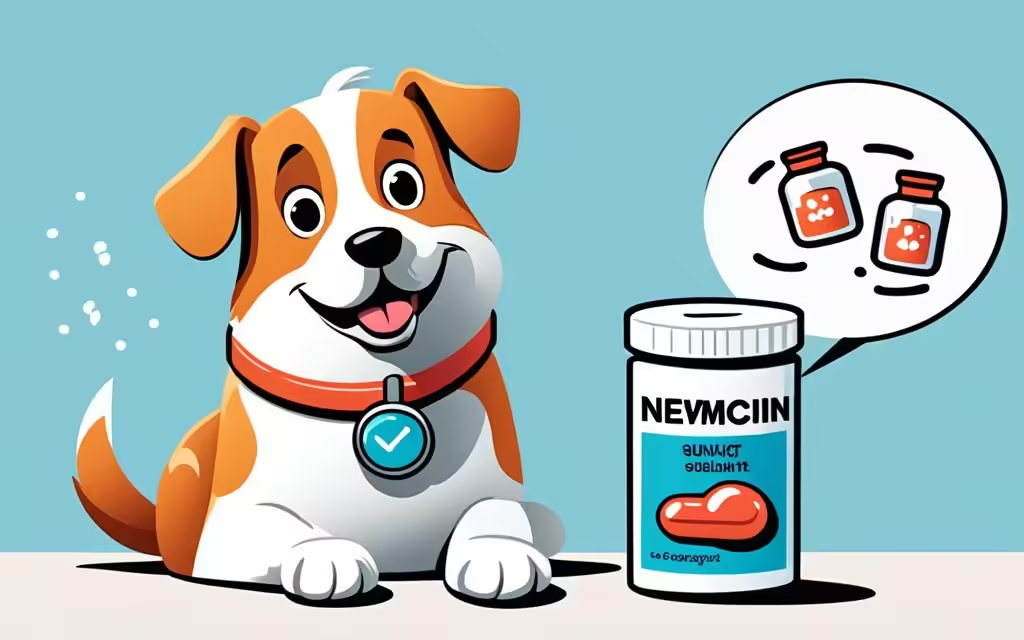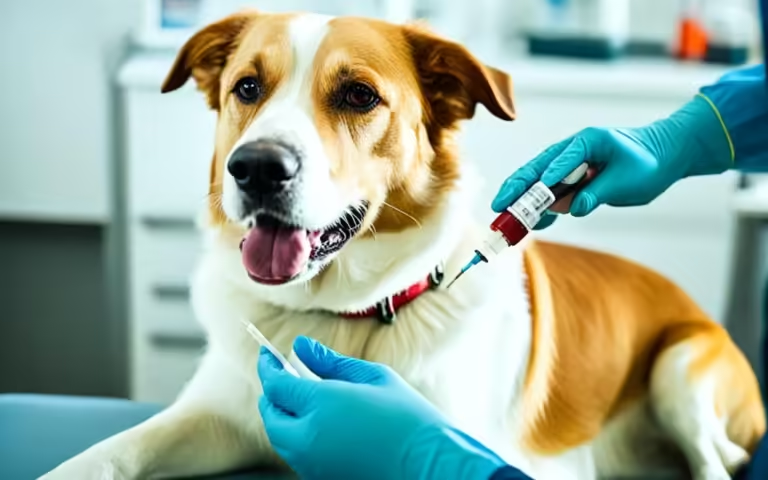Neomycin Sulfate for Dog: Canine Antibiotic Guide
Did you know that neomycin sulfate is often used for farm animals like cows and pigs? It’s mainly for treating infections in their intestines1. But, it’s not commonly used for dogs and cats. It’s mostly used off-label to help with liver problems in pets1.
Interestingly, neomycin sulfate is often given as a cream, spray, or shampoo to dogs and cats1. This shows how versatile it can be in treating different animals.
Key Takeaways
- Neomycin sulfate is an aminoglycoside antibiotic that blocks protein synthesis in susceptible bacteria.
- It is primarily used to treat bacterial infections in the intestines of farm animals, but has limited use in dogs and cats.
- Neomycin sulfate is commonly administered as a topical product, like shampoos, sprays, or eye ointments, for various species.
- Compounded formulations may be recommended in specific cases where standard medications are not suitable.
- Proper storage and administration is crucial to avoid potential side effects and toxicity in pets.
Table of Contents
What is Neomycin Sulfate?
Understanding the Antibiotic’s Classification and Uses
Neomycin sulfate is a prescription antibiotic for dogs in the aminoglycosides class2. Vets use it to treat and prevent many bacterial infections, especially in the intestines2. It works by stopping bacteria from making proteins and growing, killing the bacteria2.
This antibiotic is great for intestinal infections because it doesn’t get absorbed. It stays in the gut to work2. The same is true for its skin version, which treats skin infections without being absorbed2.
Animax® Ointment, with Neomycin sulfate, treats ear infections, skin cysts, and anal gland infections in pets2. It comes in different sizes for various needs2.
Neomycin Sulfate Ophthalmic Ointment is also FDA-approved for superficial bacterial infections in pets’ eyes3. It also has polymyxin B sulfate and bacitracin zinc for more protection3.
Neomycin and Polymyxin B Sulfates, and Bacitracin Zinc Ophthalmic Ointment, USP is sometimes used off-label in veterinary medicine4. Vets must be careful with pets that are allergic or have eye ulcers4.
How Neomycin Sulfate Works
Neomycin sulfate is a strong antibiotic from the aminoglycoside group5. This type of antibiotic stops bacteria from growing and spreading by blocking their protein-making process5. It does this by attaching to the bacterial ribosome, which is key for making proteins5.
This antibiotic doesn’t get absorbed much by the body5. So, it stays mainly in the gut, targeting gut bacteria effectively5. This targeted action helps avoid side effects in other parts of the body.
Neomycin sulfate is also used on the skin and in the eyes for dogs5. In these cases, it stays on the surface, fighting off bacteria right where it’s needed5.
It works against many types of bacteria, both gram-negative and some gram-positive5. This makes it a key antibiotic for dogs with various bacterial infections5.
But, using neomycin sulfate too much or wrongly can make bacteria resistant5. It’s important to use it as your vet says and finish the whole treatment. This helps keep the antibiotic working and stops resistant bacteria from forming5.

“Neomycin sulfate disrupts bacterial protein synthesis, leading to their death, making it bactericidal.”5
| Antibiotic | Mechanism of Action | Spectrum of Activity | Absorption |
|---|---|---|---|
| Neomycin Sulfate | Inhibits bacterial protein synthesis | Broad spectrum (Gram-negative and some Gram-positive) | Limited systemic absorption, primarily targets bacteria in the digestive tract |
Neomycin Sulfate for Dog: Canine Antibiotic Guide
Neomycin Sulfate is often used in human medicine but less so in dogs6. It’s part of Neosporin, along with bacitracin and polymyxin B7. Yet, using Neomycin Sulfate in dogs needs careful thought due to side effects and antibiotic resistance worries.
It’s not often used in dogs and cats, but for treating liver brain issues2. “Off-label” means it’s used for a purpose not listed on the label2. Vets can legally use it if they think it’s right for your pet.
Knowing the good and bad of Neomycin Sulfate in dogs is key2. It’s in Animax® Ointment, which also has Nystatin, thiostrepton, and triamcinolone acetonide2. This ointment helps with ear infections, skin issues, and anal gland problems in dogs2.
But, Neomycin Sulfate in dogs can have side effects2. Dogs may lose hearing, have enzyme issues, or suffer from more thirst, more peeing, and stomach problems2. Using steroids like triamcinolone can also lead to Cushing’s syndrome in dogs2.
Talk to your vet before giving your dog human meds like Neosporin6. Dog-specific products are safer and better for them6. Working with your vet ensures your dog gets the right treatment and avoids bad reactions.
Using Neomycin Sulfate in dogs needs careful thought and vet advice6. It has some uses but the risks and side effects must be considered. Understanding this antibiotic and talking with your vet helps make the best choices for your dog.
Administering Neomycin Sulfate to Dogs
Dosage, Frequency, and Directions
It’s important to give Neomycin Sulfate the right way to help your dog. Dogs and cats usually get 5 to 10 mg per pound (10 to 20 mg/kg) every 6 to 12 hours6. For topical use, the dose and how often you apply it depend on the issue you’re treating. It’s usually applied two or three times a day.
You can give Neomycin Sulfate with or without food, but if your pet gets upset stomach, try it with a little food or a treat6. How long you give it depends on the condition, how well it works, and any side effects. Always finish the treatment as your vet says to avoid the problem coming back.
- Neomycin Sulfate is usually given orally at 5 to 10 mg per pound (10 to 20 mg/kg) every 6 to 12 hours6.
- For topical use, the dosage and frequency depend on the specific condition being treated, usually applied two or three times daily6.
- Neomycin Sulfate can be given with or without food, but if digestive upset occurs, it can be administered with a small amount of food or a treat6.
- The duration of treatment depends on the condition, response to the medication, and development of any side effects6.
- It is essential to complete the full course of therapy as directed by your veterinarian to reduce the risk of relapse6.
Getting the dosage and application of Neomycin Sulfate right is key to managing your dog’s health. By following your vet’s advice closely, you can help your pet stay healthy and happy.

Potential Side Effects and Precautions
Neomycin Sulfate, like other antibiotics, can have side effects in dogs. Common side effects include vomiting, diarrhea, loss of appetite, and feeling tired8. It can also harm the ears and kidneys, causing hearing loss, head tilt, severe diarrhea, increased thirst, and more frequent urination8.
Topical Neomycin Sulfate can cause skin reactions like redness, irritation, and itching8. It should not be given to pets allergic to it. It can also interact with other drugs like other antibiotics, Vitamin K, and digoxin9.
If your dog needs Neomycin Sulfate for a long time, it’s important to check their kidney function often8. We don’t know much about how it affects young pets, and we’re not sure it’s safe or works well for them9.
- Neomycin Sulfate fights bacteria in the ear and skin of dogs and cats8.
- Reactions to Neomycin Sulfate in dogs are rare but can include irritation and redness8.
- It works against bacteria like Staphylococcus aureus, Proteus vulgaris, and Pseudomonas aeruginosa8.
- You need a vet’s prescription for Neomycin Sulfate, and they must check the pet’s eardrum before starting the treatment8.
Always follow your vet’s instructions when giving Neomycin Sulfate to your dog. This helps reduce the risk of side effects and ensures the medicine is used safely and effectively910.
“Neomycin Sulfate is a commonly used antibiotic, but it’s important to be aware of the potential side effects and precautions to ensure your dog’s safety and well-being.”
In summary, Neomycin Sulfate can be a good treatment for some dog infections. But, pet owners should watch their dogs closely for any bad reactions. If you see something that worries you, tell your vet right away8910.
Benefits of Neomycin Sulfate for Dogs
Neomycin sulfate is a broad-spectrum antibiotic that helps dogs a lot. It’s great at fighting off many kinds of bacterial infections, especially in the gut11. Since it doesn’t get absorbed much, it stays in the intestines and works well against gut infections11.
For skin infections, neomycin comes in topical forms that work right where they’re applied11. It stops bacteria from making proteins, which kills them fast and helps dogs get better11.
Products like Neosporin use neomycin sulfate to treat minor cuts and scrapes in dogs12. It helps protect wounds and stops bacteria from getting in. But, don’t use it in dogs’ eyes, ears, or mouth, and it’s not for deep cuts11.
It’s important to talk to a vet before using Neosporin on a dog’s wound12. They can suggest other ointments like Bactroban or Vetericyn Plus, depending on the dog’s needs12.
In short, neomycin sulfate is good for fighting many bacterial infections in dogs, both in the gut and on the skin, and it can help with wounds too. But, always use it carefully and with a vet’s advice to keep your dog safe11125.
Comparing Neomycin Sulfate to Other Antibiotics
Efficacy, Cost, and Side Effect Considerations
Pet owners often have to choose between antibiotics for their dogs. Neomycin sulfate is effective against many bacterial infections, especially in the gut13. It’s also easy on most animals, making it a good choice13.
But, neomycin sulfate doesn’t work on infections like pneumonia or blood infections13. Antibiotics like amoxicillin can fight a wider variety of infections in dogs14. Amoxicillin is given at 5 milligrams per pound of body weight, twice a day, for 7 to 14 days14.
Neomycin sulfate is cheaper than some other antibiotics13. But, the price can change based on the type and brand13. Amoxicillin with clavulanate (Clavamox) might cost between $150 to $200 for a test14.
Neomycin sulfate is usually safe, but it can cause stomach problems, hearing loss, and kidney issues13. These side effects matter when comparing it to antibiotics like amoxicillin, which can cause stomach pain and allergic reactions14.
When picking between antibiotics for dogs, think about how well they work, their cost, and their side effects1314.
Always talk to a vet to find the best antibiotic for your dog’s needs. They can help with the right dosage and how to give it.
Missed Dose and Overdose Information
When giving Neomycin Sulfate to your dog, it’s key to stick to the right dose and schedule. If you forget to give your dog their medicine, talk to your vet right away15. They might tell you to give the missed dose when you remember it, or to skip it if it’s almost time for the next one. Never give your dog more medicine than what’s prescribed, as this can cause problems15.
It’s rare for dogs to overdose on Neomycin Sulfate because it doesn’t get absorbed much by the body15. But, using it too much or if your dog has health issues, it could lead to serious problems. These include hearing loss, weakness, kidney damage, more thirst and peeing, and severe diarrhea15. If you think your dog took too much Neomycin Sulfate, call your vet or get emergency help right away15.
Knowing about the risks of missing doses or taking too much Neomycin Sulfate helps keep your dog safe. By following your vet’s advice, you can make sure your pet stays healthy and safe while they’re taking this medicine15.
“Responsible pet owners should always consult with their veterinarian if they have any concerns about missed doses or potential overdoses of Neomycin Sulfate or any other medication.”
Conclusion
is a prescription antibiotic for dogs, but it’s not often used in pets7. Vets might use it for certain conditions off-label. It kills bacteria by stopping them from making proteins16. When used right, it can safely treat bacterial infections in dogs, but watch out for side effects.
Pet owners can work with vets to see if is the best antibiotic for their dog17. They should think about how severe the infection is, the risk of side effects, and other treatment options16. The aim is to find the safest and most effective treatment for the dog.
Knowing about and other helps pet owners make good choices71716. This way, they can work with their vets for the best care for their dogs.
FAQ
What is Neomycin Sulfate?
How does Neomycin Sulfate work?
How is Neomycin Sulfate used in dogs?
What is the dosage and administration for Neomycin Sulfate in dogs?
What are the potential side effects of Neomycin Sulfate in dogs?
What are the benefits of using Neomycin Sulfate for dogs?
How does Neomycin Sulfate compare to other antibiotics for dogs?
What should I do if I miss a dose of Neomycin Sulfate for my dog?
What should I do if I suspect a Neomycin Sulfate overdose in my dog?
Source Links
- Neomycin Sulfate
- No title found
- Neomycin and Polymyxin B Sulfates, and Bacitracin Zinc Ophthalmic Ointment, USP for Animal Use – Drugs.com
- NeomycinPolymyxin BDexamethasone Ophthalmic | VCA Animal Hospitals
- Neomycin Sulfate for Dogs: Uses, Benefits, and Safety-Puainta®
- No title found
- Can You Use Neosporin On Dogs? – Dogs Naturally
- Tresaderm®
- Neomycin, Polymyxin B, And Dexamethasone (Ophthalmic Route) Side Effects
- Using Neosporin on Dogs: Safety, Usage, and More – One Vet
- Exploring the Safety of Neosporin For Dogs: Benefits, Risks, and Best Practices
- Can You Use Neosporin On Dogs? Benefits, Risks, & More | Vetnique
- Neomycin Sulfate Improves the Antimicrobial Activity of Mupirocin-Based Antibacterial Ointments
- Is amoxicillin safe for dogs?
- Nystatin Combination – Topical | VCA Animal Hospitals
- Can You Put Neosporin on a Dog Wound?
- Can I Put Neosporin on My Dog?







